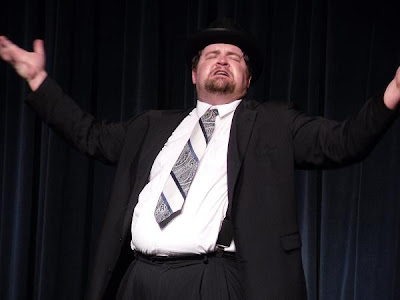Let's see, Jim was trying to tell me something, waving an incendiary article in my face, but it was, like, days and days ago, and, for an engineer-of-sorts (they called me the 'air clerk' back when I was a postdoc at ASU), I have more trouble than most just keeping myself organized.
Ah, here it is! An ominous article regarding the predisposition for Muslim engineering students to become Muslim terrorists:
Amid all the discussion of Umar Farouk Abdulmutallab and his activities prior to boarding flight 253 for Detroit, the fact that he spent three years in London studying mechanical engineering has attracted relatively little attention.Jim senses a lot of unsupported assumptions, and says:
A degree in engineering has no obvious connection with terrorism or religious/political extremism – and yet some research published earlier this year suggests it may be highly relevant.
..."Relative deprivation" happens when high expectations or ambitions run into high levels of frustration. In Muslim societies engineering is an elite profession and the entry requirements set by universities are correspondingly high. Engineering has also been promoted by governments in the Middle East and elsewhere as part of their rhetoric of modernisation and technocratic development.
The rhetoric, however, has not been matched by reality – and the researchers suggest it could be a radicalising factor:
Individuals with above-average skills selected on merit are, one would expect, particularly exposed to the frustration and the sense of injustice that comes from finding their professional future hampered by lack of opportunities. This happened on a large scale as a result of the economic and technological development failures that Middle Eastern countries have witnessed since the 1970s.
...More interesting, and perhaps more likely to apply to Abdulmutallab, is the "engineering mindset". The idea here is that engineering as a subject – unlike, say, history or literature – appeals to students who like to deal in certainties and adopt a rather mechanical view of the world. "A lot of piecemeal evidence," Gambetta and Hertog write, "suggests that characteristics such as greater intolerance of ambiguity, a belief that society can be made to work like clockwork, and dislike of democratic politics which involves compromise, are more common among engineers".
It is an interesting study in use of statistics in the social sciences. Data from disparate sources varying in both space and time are gathered together, reduced by tossing out instances that do not fit the model, processed to produce a statement that X is Y times the expected value, therefore (insert unrelated narrative statement without any proof), tested by analysing the same data in a different arrangement. The conclusion is that the "relative deprivation" in Muslim society (high expectations of academic training in engineering frustrated by low opportunities due to inept management and economic failures) combined with the "engineering mindset" (tendency toward right wing politics and rigid thought processes) result in gravitation toward radical extremism.My own take is that educated terrorists (like the 9/11 hijackers, or the Mumbai terrorists, or the Anarchists of the early 20th-Century) tend to study in those fields that society at the moment considers to be unusually-glamorous. Newbie terrorists don't want to be original thinkers: like Sarah Palin's dead fish, they want to go with the flow.
Ummmm, yeah. I can identify with the above except for the right wing politics. That's OK though because they offer statistical proof that 19th and 20th century anarchists were mostly left wing and had few engineers among their ranks. Of course, in the 19th and 20th centuries "engineers" drove locomotives designed and built by "mechanics". Based on this study it is obvious that all unemployed engineers must be prevented from boarding any aircraft or public transit at all costs.
Engineering has been very popular for the last seventy years in societies eager to gain technocratic merit, and so terrorists for the last 70 years have tended to come from that milieu. But one hundred years ago, literature was considered far more glamorous than it is today, and I bet anarchists then were likelier than most to have any number of awful romantic manuscripts stashed in their closets ("Oh, Gavrilo, Gavrilo! Don't shoot Archduke Franz Ferdinand!" "Darling, I love you forever, but I must do what is right for Serbia!").
In America today, the legal professions and acting are very popular. Thus, I would expect Hollywood to be filled with terrorist wannabes. And every so often, you meet someone who combines both tendencies: a show-business lawyer. I remember we had one of these fellows in the 2003 California Gubernatorial race, and his combination of moneyed disdain and open mockery - call it his "divaness" - terrorized all the rest of us candidates. And does the TSA keep show business lawyers from boarding planes? You'd hope so, but, sadly, they get waved on board, along with all the frustrated Gulf State civil engineers and bad French romance novelists.
And what did the quote say?:
"suggests that characteristics such as greater intolerance of ambiguity, a belief that society can be made to work like clockwork, and dislike of democratic politics which involves compromise, are more common among engineers".Substitute the word "actors" or "lawyers" for "engineers" and the quote rings just as true!































